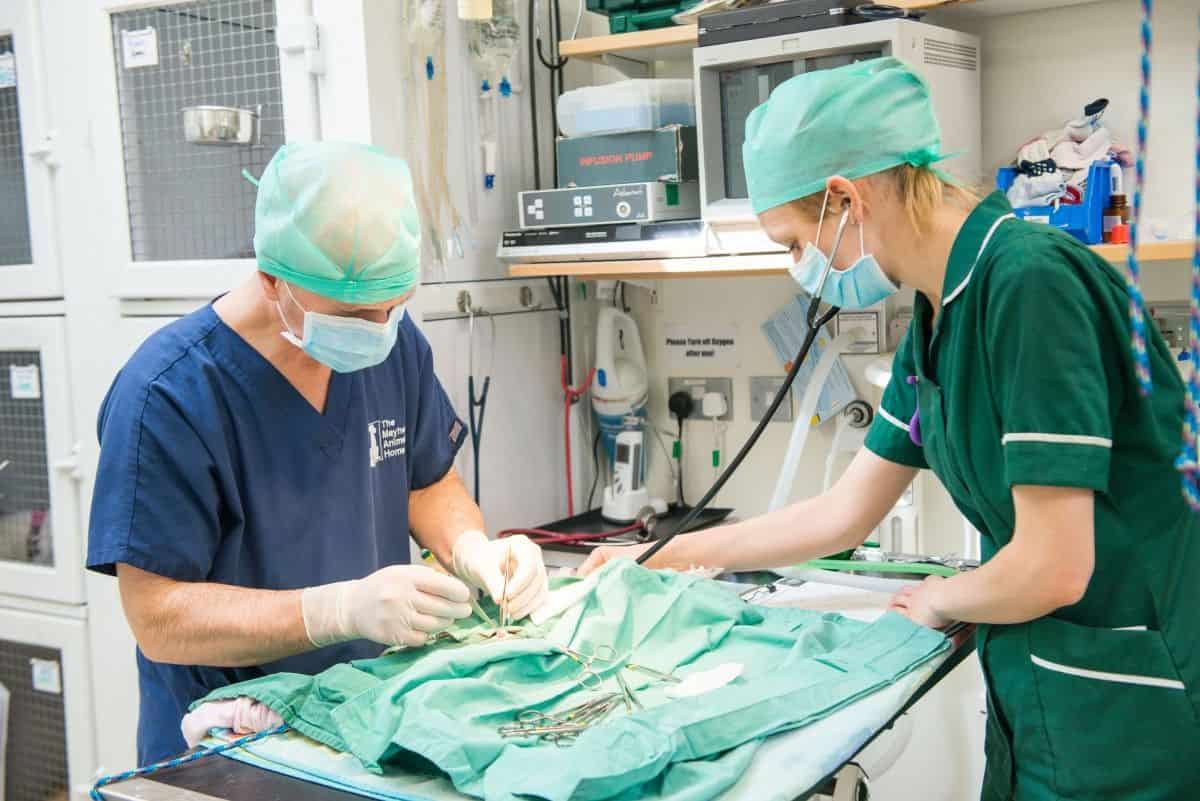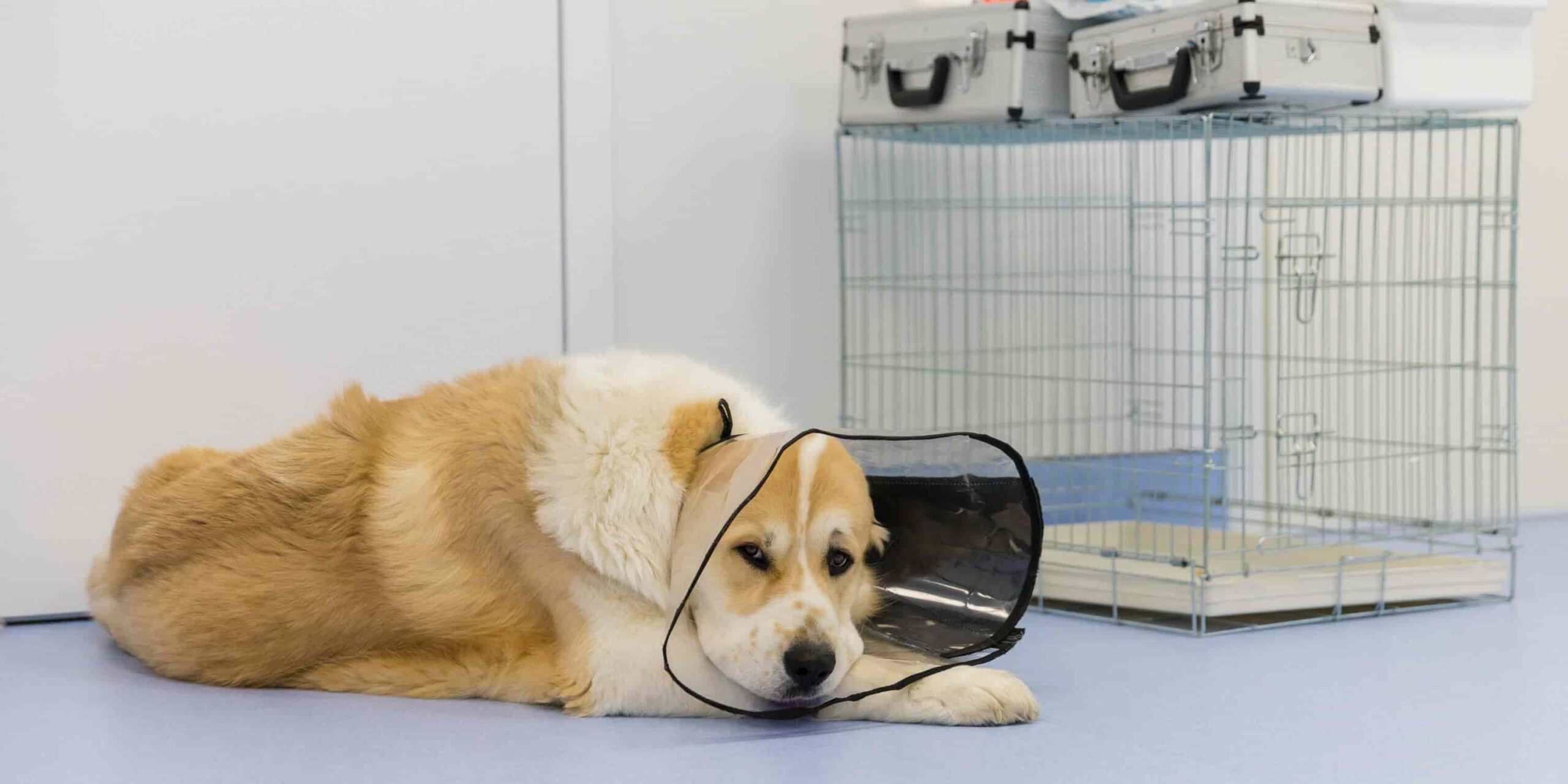Many dog owners wonder if neutering their dogs will calm them down or change their personalities. Neutering is a surgical procedure that removes the testicles or ovaries of your dog, making them unable to reproduce. Neutering can have some positive effects on your dog’s behavior, such as reducing aggression, marking, roaming, and mounting.
However, neutering is not a magic solution for all behavioral problems, and it may also have some negative effects on your dog’s health, such as weight gain, urinary incontinence, or increased risk of certain cancers.
In this article, you will learn more about what neutering is, how it affects your dog, what are the benefits and risks of neutering, how to keep your dog calm after neutering, and when to neuter your dog.
Table of Contents
What Is Neutering and How Does It Affect Your Dog?

Neutering, also known as castration, is the surgical removal of the testicles in male dogs. It is a common procedure that is performed by veterinarians to prevent unwanted litters and to improve the health and behavior of the dog. Neutering can affect your dog in various ways, depending on their age, breed, sex, and personality. Some of the possible effects are:
- Neutering can reduce or eliminate some unwanted behaviors, such as aggression, marking, roaming, and mounting. This can make your dog more calm, obedient, and sociable with other dogs and humans. However, neutering is not a guarantee for behavioral changes, and it may not work for all dogs. Some dogs may still show these behaviors due to other factors, such as genetics, environment, training, or health.
- Neutering can also have some health benefits for your dog, such as reducing the risk of certain types of cancer, such as testicular cancer and prostate cancer. Neutering can also prevent unwanted pregnancies and reduce the number of homeless dogs.
- However, neutering can also have some health risks for your dog, such as weight gain, urinary incontinence, or increased risk of certain cancers and joint disorders. Neutering can also affect the growth and development of your dog, especially if done at an early age. Therefore, you should consult your veterinarian about the best time and method to neuter your dog.
The ideal age to neuter a dog may vary depending on the breed, size, and health of the dog. The average age to neuter a dog is between six to nine months for small or toy breeds and between 12 to 18 months for larger or giant breeds.
However, this is not a fixed rule, and some dogs may benefit from neutering at a different age. Therefore, it is important to consult your veterinarian about the best time and method to neuter your dog, as well as the potential benefits and risks of the procedure.
Neutering your dog can have various effects on its behavior and health, such as reducing aggression, preventing unwanted pregnancies, lowering the risk of certain cancers, but also increasing the risk of obesity, urinary incontinence, or joint disorders.
Neutering is a personal decision that depends on your dog’s individual needs and circumstances. You should weigh the pros and cons of neutering and discuss them with your veterinarian before making a final decision.
What Are the Benefits of Neutering Your Dog?
There are many benefits to neutering your dog, both physical and behavioral. Here are some of the most common:
- Reduced risk of certain types of cancer: Neutering can help reduce the risk of certain types of cancer, such as testicular cancer and prostate cancer in male dogs, and ovarian cancer and uterine infections in female dogs.
- Prevention of unwanted litter: Neutering is the only 100% effective way to prevent unwanted litter. This can help to reduce the number of homeless dogs and cats in shelters.
- Improved housetraining: Neutering can help with housetraining in some male dogs. This is because neutered dogs are less likely to roam and mark their territory.
- Reduced aggression: Neutering can help reduce the risk of some types of aggression in male dogs, such as mounting and urine marking. However, it is important to note that neutering does not guarantee that a dog will not be aggressive.

Neutering can reduce or eliminate some unwanted behaviors, such as aggression, in your dog - Increased lifespan: Some studies have shown that neutered dogs may have a slightly longer lifespan than intact dogs. However, more research is needed to confirm this finding.
The specific benefits of neutering will vary depending on the individual dog. Some dogs may experience more benefits than others. It is important to talk to your veterinarian about the potential benefits of neutering for your dog.
Here are some additional things to keep in mind about the benefits of neutering:
- The benefits of neutering are not immediate. It may take several months or even years for the full benefits to be realized.
- The benefits of neutering are cumulative. The longer a dog is neutered, the greater the benefits.
- The benefits of neutering can be affected by other factors, such as genetics and diet.
What Are the Risks of Neutering Your Dog?
Neutering is a safe and effective procedure with few risks. However, there are some potential risks that you should be aware of before making a decision.
Physical risks:
- Bleeding: Bleeding is a common complication of any surgery, but it is usually minor and easily controlled.
- Infection: Infection is another common complication of surgery, but it can be prevented with proper care.
- Swelling: Swelling is also common after surgery, but it usually goes away on its own within a few days.
- Pain: Pain is also common after surgery, but it can be managed with medication.
- Scrotal hematoma (blood clot): A blood clot can form in the scrotum after neutering. This is a rare complication, but it can be serious if it is not treated.
- Neutering can increase the risk of certain cancers and joint disorders in your dog, especially if done at an early age. Some studies have shown that neutered dogs may have a higher risk of osteosarcoma (bone cancer), hemangiosarcoma (blood vessel cancer), lymphoma (lymph node cancer), mast cell tumors (skin cancer), hip dysplasia (abnormal hip joint), cranial cruciate ligament rupture (knee injury), and elbow dysplasia (abnormal elbow joint). However, the risk of these diseases is still relatively low and may depend on other factors, such as breed, size, and genetics.
- Testicular torsion (twisting of the testicle): This is a rare but serious complication that can occur if the testicle is not removed properly.
- Neutering can increase the risk of urinary incontinence in your dog, which means he may leak urine or have difficulty controlling his bladder. This can happen because neutering reduces the production of testosterone, which helps maintain the tone of the urethral sphincter. Urinary incontinence can cause discomfort, infection, and skin irritation for your dog. You should consult your veterinarian if your dog shows signs of urinary incontinence.
- Neutering can increase the risk of obesity in your dog, which can lead to other health problems, such as joint disease, arthritis, heart disease, pancreatitis, and diabetes. Neutered dogs tend to be less active and may eat more food than intact dogs. You should monitor your dog’s weight and adjust his diet and exercise accordingly.

Neutering can increase the risk of obesity in your dog, which can lead to other health problems
Behavioral risks:
Neutering can also have some behavioral effects on your dog, such as increasing fearfulness, anxiety, or aggression toward strangers or other animals. This can happen because neutering reduces the production of sex hormones, which can affect the brain development and function of your dog. However, these effects are not consistent and may vary depending on the individual dog. Some dogs may experience no changes or positive changes in their behavior after neutering.
- Weight gain: Neutered dogs are more likely to become overweight or obese than intact dogs. This is because neutered dogs tend to be less active and may eat more food.
- Urinary incontinence: Neutered dogs are more likely to develop urinary incontinence than intact dogs. This is a condition in which the dog loses control of their bladder.
- Increased risk of certain musculoskeletal disorders: Neutered dogs may be at an increased risk of certain musculoskeletal disorders, such as hip dysplasia and elbow dysplasia. However, the risk of these disorders is still relatively low.
The specific risks of neutering will vary depending on the individual dog. Some dogs may be more at risk of certain complications than others. It is important to talk to your veterinarian about the potential risks of neutering for your dog.
How to Keep Your Dog Calm After Neutering

After your dog gets neutered, he needs to stay calm and relatively inactive for around 2 weeks. This helps him heal and prevents the incision from tearing open. Here are some tips on how to keep your dog calm after neutering:
- Create a calm and quiet environment for your dog. Keep your dog in a quiet room with limited distractions. This will help them to relax and recover from surgery. Your dog will be calmer if his environment is calm. Put him in a quiet room without a lot of noise or other distractions. Stay calm, use a calm voice, and don’t be too active around him. Getting too excited around your dog could rile him up.
- Keep an eye on your dog. Keeping a close eye on your dog can help ensure that he stays calm. Keep the dog in the same room as you so you can discourage him if he starts running or jumping around.
- Snuggle with your dog. Sit in a place where your dog is allowed, like the couch or near his bed, and snuggle with him. Being close to you can help him as he recovers and heals after his surgery.
- Use a calming collar or diffuser. There are a number of calming collars and diffusers available that can help reduce anxiety and stress in dogs.
- Give your dog plenty of rest. Your dog will need plenty of rest to recover from surgery. Encourage them to sleep and avoid strenuous activity.
- Confine the dog when you’re not home. When you leave the house, place the dog in his crate or confine him in a room. This helps limit his activity when you can’t supervise. You can also use baby gates or an exercise pen.
- Limit exercise. Your dog should avoid strenuous exercise for at least 10 days after surgery. This will help to prevent any complications. Place your dog in a crate if he is too hyper. For some dogs, staying in the crate most of the time is better for their recovery than being let out of the crate. A dog that is too hyper, even when being monitored or placed on a leash, can tear his incision open and hurt himself. If your dog is too hyper, put him in his crate. Place the crate in a room in the house where he can be near the family. Being alone could upset him more.
- Keep the dog on a leash. Another way to control your dog’s behavior after his neutering surgery is to put him on a leash. This keeps the dog close to you and prevents him from running around or playing too roughly.
- Keep your dog away from other animals. Being around other animals may excite your dog. If you have animals in your home, keep your dog separate from them during recovery. Place them in separate rooms. Avoid putting gates between them because this could excite your dog. If you take your dog for a short walk, keep him away from other animals. Don’t take him to the dog park and take other pets outside at a different time.
- Give him a food toy. Just because your dog can’t run around doesn’t mean he can’t play calmly. Stuff some food or treats in a Kong or other food dispensing toy. This will keep your dog occupied and satisfied without causing too much physical exertion.
- Monitor your dog’s incision site. The incision site should be clean and dry. If you notice any redness, swelling, or bleeding, contact your veterinarian immediately.
- Administer pain medication as prescribed. Your veterinarian will prescribe pain medication for your dog to help them manage any discomfort after surgery. Be sure to give the medication as directed.
- Be patient and understanding. Your dog may be feeling a little bit groggy and out of sorts after surgery. Be patient and understanding with them as they recover.
When to Neuter Your Dog and How to Prepare for It
The ideal age to neuter your dog depends on a number of factors, including the breed, size, and health of the dog. However, most veterinarians recommend neutering male dogs between 6 and 9 months old, and female dogs between 6 and 12 months old. However, this is not a fixed rule, and some dogs may benefit from neutering at a different age. Therefore, it is important to consult your veterinarian about the best time and method to neuter your dog, as well as the potential benefits and risks of the procedure.
To prepare for your dog’s neutering, you will need to follow these steps:
- Schedule an appointment with your veterinarian. Your veterinarian will examine your dog and perform some tests to make sure he or she is healthy enough for surgery. Your veterinarian will also give you instructions on how to prepare your dog for the surgery, such as fasting him or her for 12 hours before the procedure.
- Fast your dog for 12 hours before surgery. This will help to prevent vomiting and aspiration during surgery.
- Give your dog a bath the day before surgery. This will help to keep the incision site clean.
- Arrange for transportation and recovery. You will need to bring your dog to the veterinary clinic on the day of the surgery and pick him or her up after he or she is discharged. You will also need to provide a comfortable and quiet place for your dog to rest and recover at home. You may need to restrict his or her activity and monitor his or her incision for signs of infection or bleeding.
- Follow the post-operative care instructions. Your veterinarian will give you some medications and instructions on how to care for your dog after the surgery. You will need to give your dog painkillers and antibiotics as prescribed, keep his or her incision clean and dry, prevent him or her from licking or chewing on his or her stitches, and check for any signs of complications. You will also need to bring your dog back to the clinic for a follow-up visit and stitch removal.
Here are some things to consider when deciding when to neuter your dog:
- Breed: Some breeds are more prone to certain health problems, such as testicular cancer or prostate cancer. Neutering can help to reduce the risk of these problems in some breeds.
- Size: Larger dogs tend to develop certain health problems, such as hip dysplasia, at a later age than smaller dogs. Neutering may be done at a later age in larger dogs to avoid these problems.
- Health: If your dog has any health problems, such as heart disease or diabetes, you should talk to your veterinarian about the best time to neuter them.



